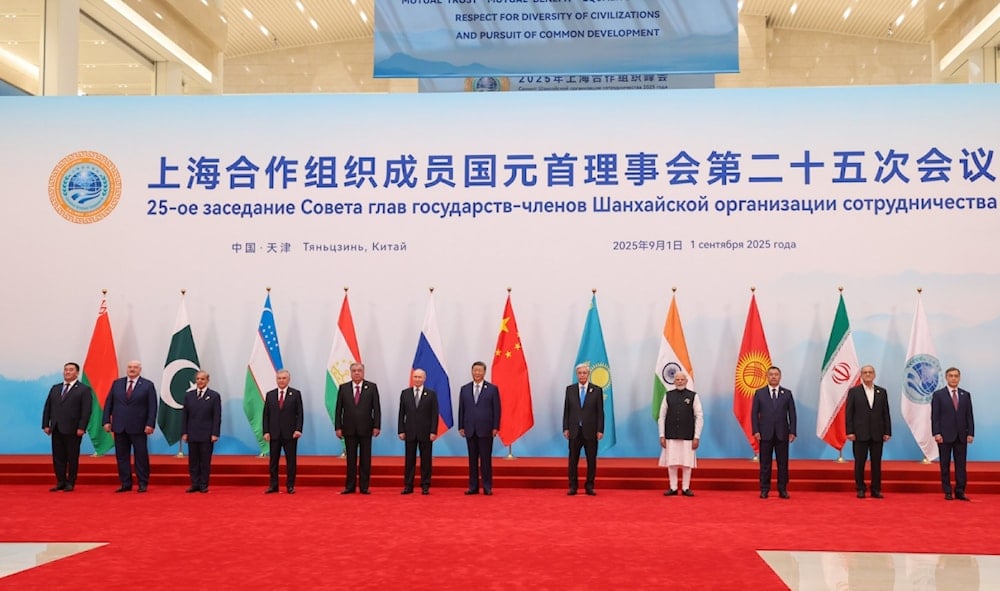SCO leaders adopt Tianjin Declaration, signal push for multipolarity
SCO leaders adopted the Tianjin Declaration, pledging deeper security, economic, and energy cooperation while rejecting Western sanctions and promoting a multipolar global order.
-

In this pool photograph distributed by the Russian state agency Sputnik, (2nd L-R) Belarus' President Alexander Lukashenko, Pakistan's Prime Minister Shehbaz Sharif, Uzbekistan's President Shavkat Mirziyoyev, Tajikistan's President Emomali Rahmon, Russia's President Vladimir Putin, China's President Xi Jinping, Kazakhstan's President Kassym-Jomart Tokayev, India's Prime Minister Narendra Modi, Kyrgyzstan's President Sadyr Japarov and Iran's President Masoud Pezeshkian pose for a group photo during the Shanghai Cooperation Organization (SCO) Summit in Tianjin on September 1, 2025. (AFP)
Leaders of the Shanghai Cooperation Organization (SCO) concluded their summit in the Chinese city of Tianjin with the adoption of the Tianjin Declaration, a document laying out the bloc's commitment to security cooperation, economic integration, and the creation of a multipolar world order.
The declaration pledges enhanced counter-terrorism cooperation and joint efforts to combat radical ideologies, religious intolerance, and aggressive nationalism. It also calls for new agreements on military confidence-building and trade facilitation, and stresses coordination in fighting corruption, urging the international community to deny asylum to offenders. Member states further voiced opposition to unilateral coercive measures, seen as a direct rebuke to Western sanctions.
Chinese President Xi Jinping used the summit to push for greater institutional development, proposing an SCO development bank, an energy cooperation platform, and access to China's BeiDou satellite navigation system. He pledged more than $1.4 billion in loans to support joint projects. Russian President Vladimir Putin backed Xi's vision, describing the SCO as a model for reforming global governance and offering a "more just and equal system."
Tianjin multipolar vision
The summit, the largest in SCO history, saw the inclusion of new partners such as Laos, bringing the total number of members and dialogue partners to 27. This expansion underscores the bloc's ambition to strengthen its role as a Global South counterweight to US-led institutions.
Indian Prime Minister Narendra Modi used the platform to stress India's strategic autonomy, weaving his government's mantra of "One Earth, One Family, One Future" into the final declaration. India also pressed the issue of cross-border terrorism while signaling its independence from both Washington and Beijing.
The declaration outlines plans for an upcoming SCO-Plus security dialogue in Uzbekistan, expanded energy cooperation with dialogue partners, and stronger collaboration with the United Nations. It also takes a firm stance against the militarization of information and communication technologies and calls for deeper cooperation in the fight against narcotics.
#Tianjin Declaration of the Council of Heads of State of the Shanghai Cooperation Organisation (#SCO)
— DD India (@DDIndialive) September 1, 2025
"Member States advocate respect for the right of peoples to independently and democratically choose their own paths of political and socio-economic development, and emphasise… pic.twitter.com/ab4E2FQj8E
Analysts say the Tianjin Declaration reflects the SCO's effort to present itself as an alternative model of international order. As noted by Xi, the bloc's future lies in building "an entirely new system of global governance" that stands apart from Western dominance.
Read more: Russia, China, India form axis of new order, Alexander Dugin argues

 3 Min Read
3 Min Read










